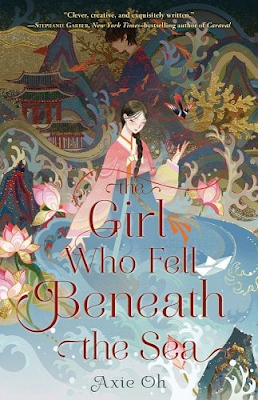Review: The Girl Who Fell Beneath the Sea
The Girl Who Fell Beneath the Sea by Axie Oh is an Asian-inspired book that was recommended to me by a friend. It does not have any princesses in it per se, but it is (very) loosely based on a Korean fairy tale called "The Tale of Shim Cheong." It incorporates the concept of sacrificial brides, which overlaps with the common princess trope of forced marriage alliances and the desire to be free. Typically, these types of stories end with the princess or maiden either falling in love with her captor, which can come off as toxic unless it's done well, or escaping, if her betrothed is truly irredeemable. One such book I reviewed was The Princess Curse, in which a girl was forced to marry a demon and eventually came to terms with their relationship. This book did not come off as romantic to me in the slightest. However, I also read Stolen Midsummer Bride by Tara Grayce a few weeks ago, about a girl who voluntarily chooses to get kidnapped as a fae bride for personal reasons, and found it surprisingly cute. This book had too many things happening to be construed as toxic or cute, but it was certainly a unique reading experience.
The Girl Who Fell Beneath the Sea is compared by readers to the Hayao Miyazaki movie Spirited Away, which is more beloved for its unique worldbuilding than for its memorable characters. I've always thought that film was just okay for that reason, and I feel the same about this book. The main character, Mina, begins as a strong heroine who sacrifices herself to marry the Sea God in place of her brother's lover, Shim Cheong, so that they can be together. This selfless act pulls her down the rabbit hole into the spirit realm, a lush Asian mythology-inspired environment of spirits, gods, and goddesses. After this, the story gets a little muddled as we meet an unnecessarily large cast of characters from the spirit realm who are unique in their own way, but are difficult to keep track of and do not have any defining personality traits to speak of.
Mina finds herself caught in a love triangle between the Sea God, who turns out to be a young boy that just wants to be told bedtime stories, and Shin, one of the spirits she meets upon entering the mythological realm. She is tied to both of them at different times through the Red String of Fate, a concept from Chinese mythology that represents the overlapping fates of True Love. While the reason for the switching string is explained at the end of the book, it's difficult to know which of the two relationships to root for since neither of the bonds that Mina shares comes off as romantic, especially considering that she never wanted to enter the spirit realm in the first place. Though the author does an excellent job of building a believable fantasy world, she struggles to build a believable love story.
The book spends a lot of time exploring the dichotomy between destiny and free will. Mina changes Shim Cheong's fate at the beginning, but then it turns out that Shim Cheong was always meant to enter the spirit realm anyway. Does that mean Mina's sacrifice was in vain because everything had already been pre-determined? Mina's marriage to the Sea God was supposed to be destined by the Red String of Fate, but then the string is cut, and a new one appears that connects her to Shin. So does she have free will or doesn't she? The answer that the book gives to this question lies somewhere in the middle. The delicate balance between destiny and free will is so difficult to maintain that the time the narrative spends doing so causes it to lose many opportunities to build genuine relationships between Mina and the characters whose lives she touched.
It's not too surprising that if Spirited Away was not my cup of tea, a book that was heavily inspired by it would not become one of my favorites. Despite that, I can see why Miyazaki fans would enjoy reading this. It contains rich visuals and pays worthy tribute to various aspects of Asian mythology. It was nice that the main character decided to take control of her own destiny at the beginning of the story even though it gets pretty muddled after that. I think I would have enjoyed it more if there were fewer characters that Mina encountered in the spirit realm and placed more focus on why she began to develop feelings for Shin after the Red String of Fate tied her to him instead. This is a good book for fans of Asian mythology and Studio Ghibli movies, but I would warn any hopeless romantics out there not to expect to be swept away by a life-changing love story.












Comments